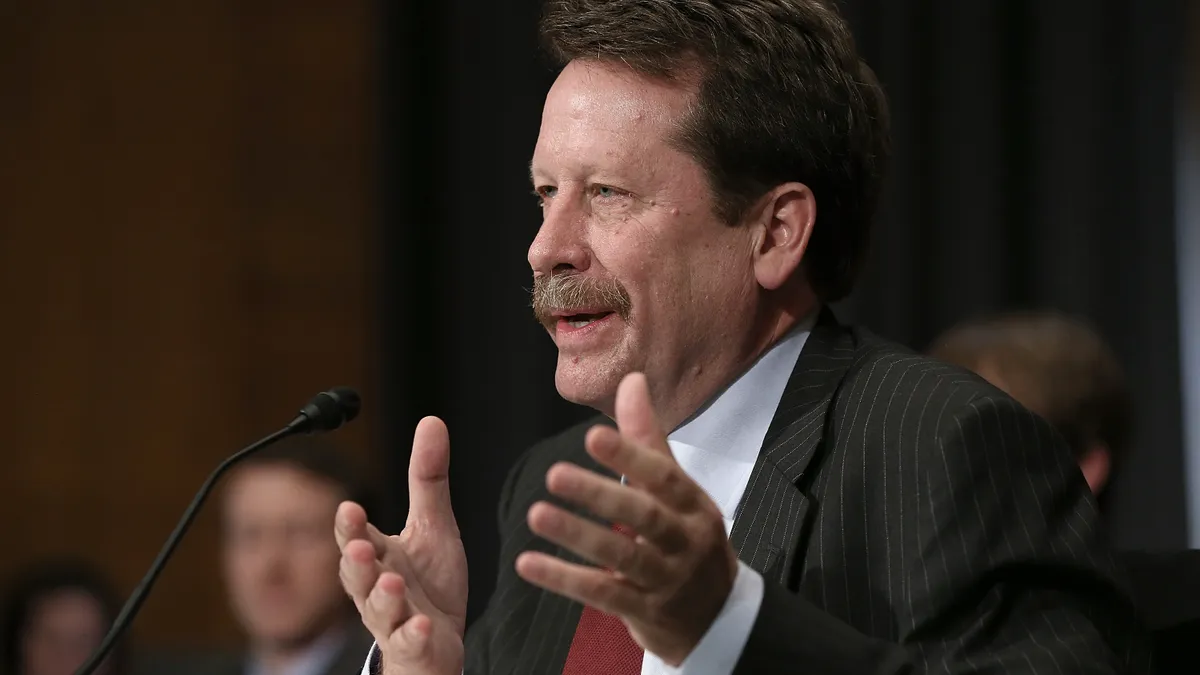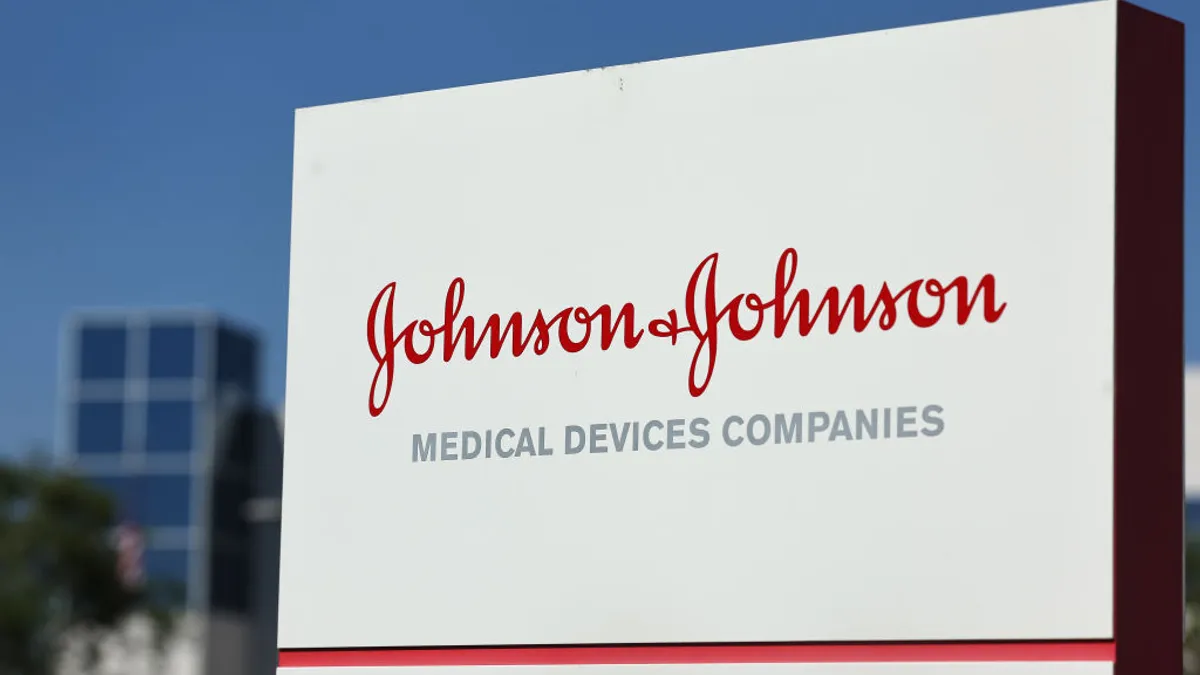President Joe Biden on Friday nominated former Food and Drug Administration head Robert Califf to return to the agency as its commissioner, choosing a familiar name to lead the regulator after a drawn-out search.
Califf, a cardiologist and prolific researcher, served as FDA commissioner for less than a year at the end of the Obama administration. After leaving government, he advised Google and its health spinoff Verily Life Sciences, taking a job leading health policy there in November 2019.
"Dr. Robert Califf is one of the most experienced clinical trialists in the country, and has the experience and expertise to lead the Food and Drug Administration during a critical time in our nation's fight to put an end to the coronavirus pandemic," Biden said in a statement.
Biden's choice has been long awaited as he left one of the nation's highest-profile public health roles unfilled for more than eight months, even as his administration made the U.S. response to COVID-19 its top priority.
Janet Woodcock, a longtime top agency official, has served as acting commissioner during the search process, and was at one point considered a leading contender for the position. But her role overseeing the FDA's main drug review office as opioid overdoses became a nationwide epidemic drew criticism from lawmakers, as did the agency's controversial approval of Biogen's Alzheimer's drug Aduhelm under her watch.
In his statement, Biden said Woodcock "has done an incredible job leading the agency during what has been a busy and challenging time."
Woodcock can only serve as acting commissioner until Nov. 15 under federal rules, although she can continue in her role afterwards while the Senate considers Califf's nomination.
Califf's experience and familiarity with the agency will likely count in his favor, said Mark McCellan, an FDA commissioner during the early 2000s. "He has led the FDA, so he knows the agency and how to build on its strengths and address challenges from day one," McLellan told BioPharma Dive in a recent email.
Confirmation still may not be smooth sailing in the Senate, though. In 2015 and early 2016, several Democratic senators delayed confirming him to the role over their anger with the FDA for its approvals of opioid painkillers. (Califf served as a deputy director at the agency before being nominated.)
Califf's ties to the life sciences industry, which are now stronger due to his position with Verily, were also a point of contention in confirmation hearings the last time around. In addition to his work with Google, Califf has previously consulted with several large pharmaceutical companies, including Merck & Co. and Amgen.
He was ultimately confirmed as commissioner by an 89-4 vote.
Some of the same issues could feature during hearings again, as could a particularly contentious drug approval decision made by the FDA in 2016 while Califf led the agency. At the time, FDA staff were sharply divided over whether to clear a Duchenne muscular dystrophy drug, with one side appealing to Califf to mediate the dispute. Califf sided with Woodcock, then director of the FDA's drug review division, and the medicine was approved.
A number of other candidates were floated as Biden's commissioner, including other former FDA leaders like Joshua Sharfstein as well as former Obama administration official Greg Simon. Also reportedly considered were Michelle McMurry-Heath, the CEO of the drugmaker lobbying group BIO, and medical academics like Dana-Farber Cancer Institute president Laurie Glimcher and Harvard Medical School's Monica Bertagnolli.
The Washington Post first reported Califf was a leading candidate on Oct. 14. The Associated Press and The Wall Street Journal, among others, reported earlier on Friday that Biden had made his decision.
Although Biden was criticized for leaving the FDA without a permanent leader during a critical moment, the gap between confirmed commissioners is not unusually long by historical standards.
The FDA was without a permanent head for over a year after McClellan, President George W. Bush's first appointee, resigned to lead the Centers for Medicare & Medicaid Services, for example. More than 10 months passed between Margaret Hamburg's resignation and the start of Califf's tenure during Barack Obama's administration, and eight months elapsed between Scott Gottlieb and Stephen Hahn during Donald Trump's presidency.
If confirmed, Califf would take over an agency that's been heavily stressed by the pandemic and the resulting workload of reviewing new tests, vaccines and drugs for COVID-19.
Center for Devices and Radiological Health Director Jeff Shuren is managing a backlog of initiatives back-burnered amid the pandemic, from negotiating the next round of industry user fees via MDUFA, applying regulatory flexibilities used during the crisis to traditional processes and piloting programs like one focused on safer technologies.
Bradley Merrill Thompson, attorney at the law firm Epstein Becker Green, described Califf as "extraordinarily knowledgeable" about digital health issues.
"Cardiology is the second most popular therapeutic area for AI, interpreting EKG waveforms and such. He also obviously has strong regulatory knowledge which helps him hit the ground running," Thompson said.
However, the immediate priority will remain COVID-19 as the FDA continues its breakneck review pace.
Pandemic-related work will linger, including working on emergency use authorizations that will expire once the public health emergency ends. FDA’s testing division stumbled early in the pandemic, criticized for moving too slowly in some cases but too quickly in others, like opening up antibody testing.
When news of Califf's nomination first broke in October, Cowen analysts wrote that it "would be a victory for supporters of the status quo at the agency when it comes to the overall approach to new drug reviews and interactions with industry."
Note: This story has been updated with White House confirmation of the president's decision.





















